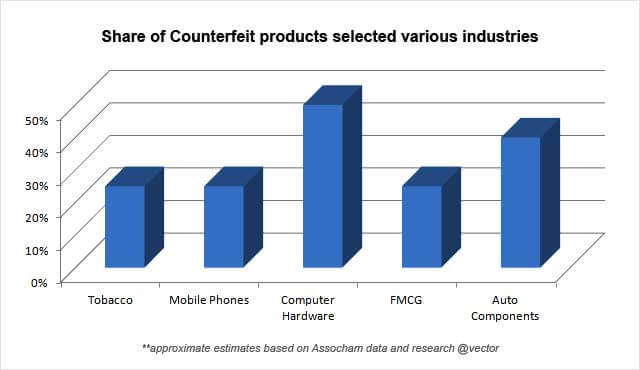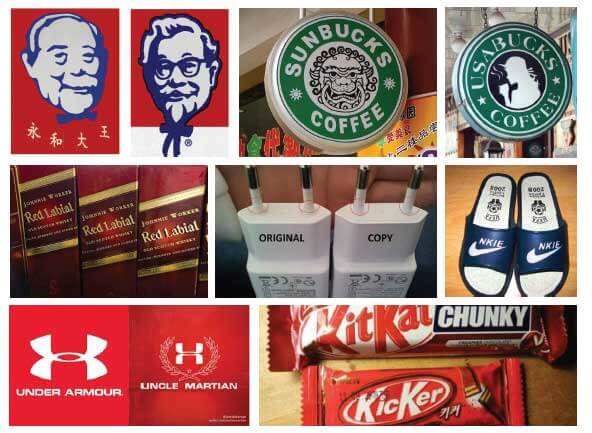According to a recent report prepared for ICC's BASCAP (Business Action to Stop Counterfeiting and Piracy) as well as for INTA, the negative impacts of counterfeiting and piracy are projected to drain US$ 4.2 trillion from the global economy and put 5.4 million legitimate jobs at risk by 2022. The Organisation for Economic Co-operation and Development (OECD) estimates global trade-related counterfeiting to be accounting for 2.5% of the world trade or US$ 461 billion.
A report from FICCI, the Federation of Indian Chambers of Commerce and Industry states that the increase in the estimated loss to 7 manufacturing industry sectors in India due to counterfeiting from 2012 to 2014 is to the tune of 44.4% and the estimated annual tax loss to the Indian government was estimated at INR 39,239 crore (US$ 6117.5 million). According to an Indian study, the highest revenue losing industries were:
- FMCG (packaged goods) at US$ 3.28 billion
- FMCG (personal goods) at US$ 2.43 billion
- Auto components at US$ 1.48 billion,
- Mobile phones and accessories at US$ 1.45 billion
- Tobacco at US$ 1.44 billion
The first National IPR Policy announced by the Government of India in May 2016, has taken note of the seriousness of the situation and has given special emphasis to create effective mechanisms to enforce IP Rights through administrative agencies including the Police. The Policy further envisages:
- Creation of IPR cells in state police forces.
- Focus on enhanced coordination between various enforcement agencies, adjudication of IP disputes through specialized commercial courts and alternate dispute resolution for speedy disposal.
- Amending existing IP laws, rules and regulations to bring clarity and transparency and time bound processes in administration and enforcement of IP rights.
- The need to suitably amend statutes to address illegal duplication of cinematographic films has been emphasized.
Launch of IPR Enforcement Toolkit and training programs for the Police
- Ministry of Commerce & Industry, Government of India in January, 2017 launched an IPR Enforcement Toolkit for the Police, jointly prepared by Cell for IPR Promotion and Management (CIPAM) and FICCI. This toolkit acts as a ready reckoner for enforcement agencies in combatting IP crimes, specifically Trade Marks Counterfeiting and Copyright Piracy.
- CIPAM organized seven batches of training programmes for Police officials in the State of Andhra Pradesh and a three day training programme for APOs and Police Officials in the State of Uttar Pradesh.
- The Crime Branch of Chandigarh Police was awarded and recognized as the Best Police Unit for Enforcement of IP in the Country. This highly prestigious award duly recognizes the efforts made involving filings of FIRs, conducting raids and seizures and filing of charge-sheets for IP infringements.
- Anti-Piracy Cell ('APC') of the Kerala police detected 170 cases throughout the state in 2015.

Important cases on Anti-Counterfeiting
- In Cartier International AG and Ors. v. Gaurav
Bhatia and Ors. 2016 (65) PTC 168 (Del), the Court
found the defendants guilty of offering for sale on their website
www.digaaz.com and supplying
massive quantities of counterfeit products bearing several
registered trademarks of various luxury brands including those of
the plaintiffs.
It was observed that the plaintiffs are renowned the world over for manufacture and sale of high end luxury products inter alia under the brands CARTIER, PANERAI, VACHERON CONSTANTIN and JAEGER LECOULTRE and the defendants blatantly imitated the same for the sale of their counterfeit products. -
The court inter alia awarding heavy punitive damages ofINR 1 crore (Approx. US$ 149,667) against the defendants held that the matter was a rank case of dishonesty where piracy committed by defendants was apparent on the face of the record.
- In Louis Vuitton Malletier v. Plastic Cottage Trading Co., the Deputy Commissioner of Customs, Mumbai ordered for disposal and destruction of counterfeit Louis Vuitton ladies' bags imported into India by M/s. Plastic Cottage Trading Co. under Bill of Entry No. 8154543 dated 8th October, 2012. The Commissioner seized the suspected shipment, issued show cause notice to the importer and the matter was consequently adjudicated and order was passed for absolute confiscation (destruction) of the impugned goods and for ultimate disposal thereof. Additionally, a penalty of INR 1,40,000/- (Approx. US$ 2095) was imposed on the importer.
- Flamagas, SA v. Irfan Ahmed and Ors.
CS (Comm.) 895/2016; Decided on:
04.11.2016
This Court enforced the plaintiff's registration in India over a shape mark and held that the defendants were infringing the registered mark by making exact replica thereof. The court deciding the matter in favour of the plaintiff awarded punitive damages of INR 3,00,000/- (Approx. US$ 4677) against the plaintiff along with an order of permanent injunction restraining infringement and passing off of the plaintiff's mark. - Burberry Limited and Ors. v. Digaaz.Com/Digaaz-Ecommerce Pvt. Ltd. and Ors. CS (OS) 576/2014; Decided on: 21.02.2017
 |
 |
BURBERRY, & BURBERRY which are the registered trademarks of the plaintiff, were found to be used by the defendant to sell counterfeit products such as shirts and handbags on its website www.digaaz.com. The defendants did not appear in the case even after repeated attempts were made to cause their appearance and the Court decided the matter ex-parte and issued permanent injunction against the defendants restraining them from using the plaintiff's mark in any manner including for advertising on their websites or on other social networking websites.

The content of this article is intended to provide a general guide to the subject matter. Specialist advice should be sought about your specific circumstances.
